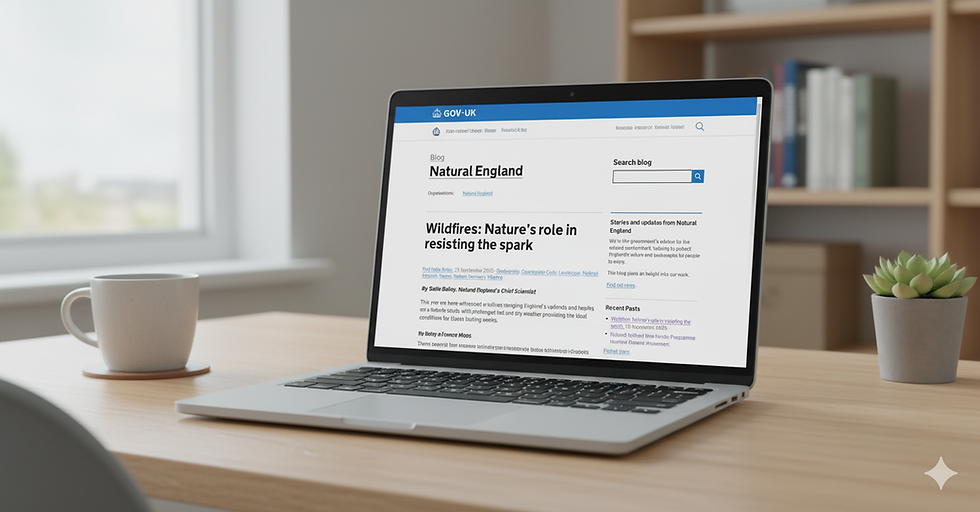Natural England’s Wildfire Contradictions and How They Back Our Case
- Andrew Gilruth

- Oct 3, 2025
- 2 min read

Moorland Association members will remember that Natural England’s legal department has expressly stated that it does not advise government or anyone else on wildfire risk:
“Our role is not to advise Government, other public bodies, those managing land or anyone else on health and safety or fire safety.”
Four days ago we highlighted that its Chief Scientist, Sallie Bailey, appeared not know this.
Today its Director of Strategy, John Holmes, once again strayed into that very territory. He claimed that "wet, restored peatlands can be more resilient to wildfires”, and cited Natural England’s Chief Scientist on nature’s role in “resisting the spark”.
In doing so, Natural England has once again contradicted its own declared remit, offering public advice on wildfire risk and wildfire resilience.
Why this matters
This contradiction is not a one-off. Holmes’ comments effectively step into the middle of a policy debate on wildfire, which the Government consultation on burning failed to address properly. Crucially, his blog also unwittingly supports many of the points made by the Moorland Association in its consultation response earlier this year:
Uncertainty about alternatives to burning
MA consultation response: cutting is impractical in many upland settings, leaves dangerous brash, and has not been tested over the long term.
John Holmes: acknowledges that “relatively little is known” about cutting, warns of archaeological damage and peat compaction.
Rewetting is not a guaranteed wildfire solution
MA consultation response: rewetted peat can still burn during droughts; assuming it always protects peat is dangerous.
John Holmes: concedes that burning may still be needed even on Natural England’s own National Nature Reserves.
Over-reliance on NEER155
MA consultation response: Defra failed to consult properly on NEER155, which is biased and methodologically weak.
John Holmes: cites NEER155 as his evidence base, underlining our point that this contested review has been central to policy decisions.
Wildfire dimension ignored
MA consultation response: restricting burning increases fuel loads, raising wildfire risk.
Holmes: fails to explain how unmanaged fuel loads will be controlled.
Reinforcement from experts
The Future Landscapes Forum’s most recent position statement adds weight to our concerns:
It highlights serious flaws and bias in Natural England’s evidence reviews (e.g. EMBER, NEER155), noting that they often misinterpret data and dismiss long-term research.
It warns that banning burning will increase fuel loads and wildfire risk, with rewetting and cutting unproven as landscape-scale wildfire solutions.
It states plainly that if Defra and Natural England remove burning as a tool, they must accept responsibility for the consequences, including the cost of wildfires, the loss of estate-led firefighting capacity and the risks to public safety.
The bigger picture
Taken together, John Holmes’ blog, the Future Landscapes Forum statement and the Moorland Association’s consultation response all point to the same conclusion:
Natural England is blurring its remit by giving wildfire advice while denying responsibility for it.
Defra has pressed ahead on weak evidence, ignoring key warnings from fire experts and land managers.
The policies risk making wildfires more frequent, more intense and more costly.
This is exactly the case the Moorland Association has been making throughout the consultation. The new regulations are not only flawed in process, but dangerous in outcome.
📧 Keep updated on all moorland issues - sign up for our FREE weekly newsletter.



